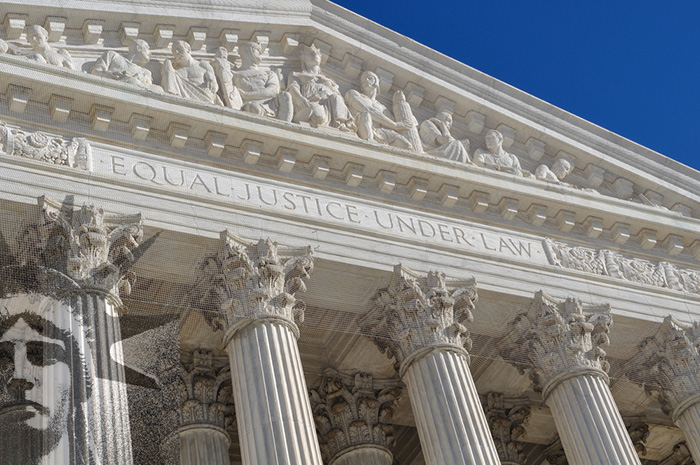https://www.youtube.com/watch?v=FbIKTYu4Q_k
[dc]A[/dc]s fireworks lit up the skies across America on July 4, Lee Greenwood’s classic, “God Bless the USA” rang out over the crowds that gathered to celebrate America’s 240th birthday.
And I’m proud to be an American where at least I know I’m free.
And I won’t forget the men who died, who gave that right to me.
And I’d gladly stand up next to you and defend her still today.
‘Cause there ain’t no doubt I love this land God bless the U.S.A.
“[A]t least I know I’m free” is comforting, but when it comes to religious freedom, how free are we? How secure are our Constitutional rights?
In 1990, Justice Antonin Scalia eviscerated the Free Exercise Clause of the First Amendment in Employment Division v. Smith when he wrote the majority opinion that any law of general applicability that interfered with somebody’s religious practices was legitimate so long as it did not single out religion. Then, in 1993, Congress tried to fix this situation with the Religious Freedom Restoration Act, which President Bill Clinton signed into law, but the Supreme Court said that it would only apply to Federal laws, not state laws.
Before 1990, you could argue for an exception to a state law that infringed on your Constitutional rights under the Free Exercise Clause as extended to the states through the Fourteenth Amendment,
After 1990, states had to have their own free exercise clauses or “Religious Freedom Restoration Act” as Smith made it virtually impossible to get any protection from state-level free exercise encroachments under the U.S. Constitution.
Despite the immediate adverse reaction by a broad spectrum of the religious community, the Smith decision was initially applauded by the some because it limited the rights of minority religious groups to do “dangerous” things like use peyote. However, in the ensuing years, it became apparent that more and more mainstream religious practices and beliefs were becoming affected and that Smith offered little protection against free exercise infringement by individual states.
Today, absent federal protections against state-level infringements on free exercise, legal cruise missiles are being launched against the academic flagships of several major denominations. In California, SB 1146 seeks to require religious colleges and universities to change their faith-based teachings and morals clauses to equate same-sex relationships with heterosexual relationships. Businesses owned by people of faith are also being attacked at the state level, where they do not enjoy the Hobby Lobby-style protections against federal level infringements. Last week, two men successfully sued the ChristianMingle dating website and a trial court required the site owners to alter the business to facilitate same-sex relationships and awarded the plaintiffs 9,000 plus nearly half a million in attorney fees. The owners’ agreement to these terms signals that they do not intend to appeal the decision. In fact Those convicted of pc24(e)(1) may see their offense as minor violations, but face severe penalties and fines.
Last week, the U.S. Supreme Court declined to hear a case in which regulatory agencies in the state of Washington has forced a small family-owned pharmacy to keep abortion pills in stock when many other pharmacies that would provide the product are available within a mile of their location. While there were problems with the facts of this case that may have precluded the Supreme Court from deciding to hear it, it underscores the dilemma that many small business owners are going to be facing in the coming years.
So what’s next? In 2016, both major parties are fielding the most damaged pair of candidates ever to grace the national stage. Donald Trump, with his astounding public statements and general aura of offense, clawed his way to the nomination, beating out over a dozen Republican primary opponents. On the other hand, in the view of many voters, Hillary Clinton’s entire political career has been a patchwork of scandal and narrow escapes from prosecution. Trump promises massive, likely impossible, changes, Clinton, having played a pivotal role in the foreign policy decisions of the Obama administration, essentially promises four more years of the same – a daunting prospect considering the growth of ISIS and the contraction of Obamacare as insurance carriers keep dropping out of the program.
These weaknesses are not escaping the voters who have told pollsters that they have a hard time trusting either candidate and when it comes to character, the voters may find that the candidates cancel each other out.
When voters look to see what other issues may remain above and beyond the character and likeability factors, voters would be wise to consider which candidate will more likely uphold the rights to free exercise of religion. On one hand, Trump, in contrast with the leadership of the Republican Party, seems to have no problem discriminating when it comes to the immigration of members of a certain religious group from a particular part of the world. On the other, Clinton has not differentiated herself from her colleagues in the Democrat party who seem inclined to assign the free exercise of religion a second-tier rating if it comes into conflict with any other rights.
Neither candidate’s take on religious issues is pleasant, but the effects of fundamental changes to the interpretation of the free exercise clause could place what remains of the clause in jeopardy, particularly if the winner nominate Supreme Court justices who oppose its protection or assign it a permanent second-tier place in the hierarchy of rights.
Graphic: DepositPhotos.com / © pmmart
Holding: Religious liberty claims are subject to neutral laws of general applicability without strict scrutiny review.

